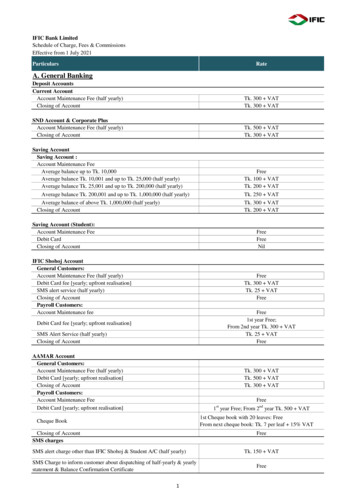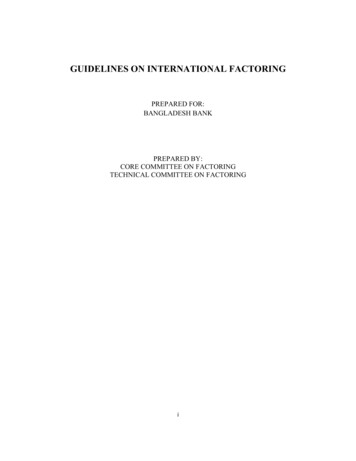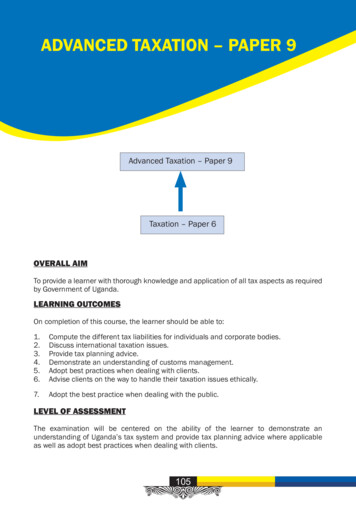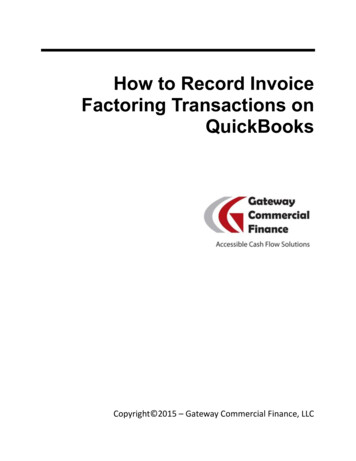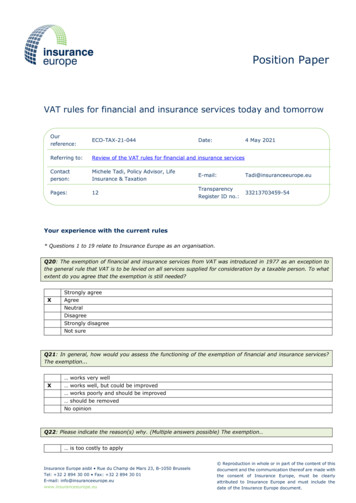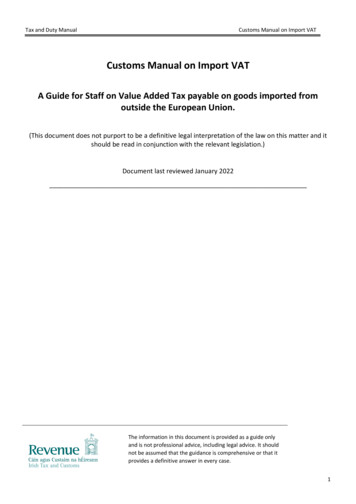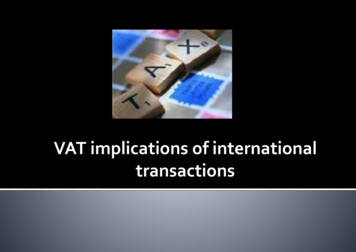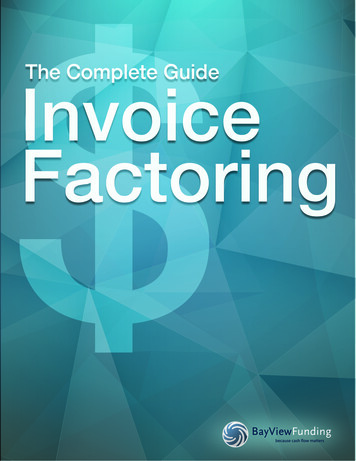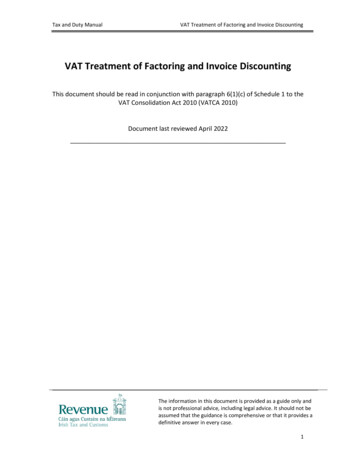
Transcription
Tax and Duty ManualVAT Treatment of Factoring and Invoice DiscountingVAT Treatment of Factoring and Invoice DiscountingThis document should be read in conjunction with paragraph 6(1)(c) of Schedule 1 to theVAT Consolidation Act 2010 (VATCA 2010)Document last reviewed April 2022The information in this document is provided as a guide only andis not professional advice, including legal advice. It should not beassumed that the guidance is comprehensive or that it provides adefinitive answer in every case.1
Tax and Duty ManualVAT & Debt Factoring and Invoice DiscountingTable of ContentsIntroduction.31Purpose of this Guidance.32MKG case and the Hagemeyer case .43VAT Treatment.5Appendix 1.8Scenario 1 Non-recourse factoring – i.e. "true factoring" .8Scenario 2 Factoring with recourse, i.e. "quasi-factoring" .10Scenario 3 Invoice Discounting without recourse – i.e. "true-factoring" .10Scenario 4 – Invoice discounting with recourse i.e. "quasi factoring".11Scenario 5 – Simple Transfer of Debt .12General Note .12Appendix 2.13VAT treatment of debt factoring – treatment of certain fees and charges .13Take-on Fee (of a fixed amount).14Arrangement Fee .14Computerised Services .14Collect-out Fee.14General Indemnities .14Facility Fee (payable on each anniversary) .15Arrangement fee (for variations to the agreement or services outside of its scope).15Costs of outside visits .15Legal fees incurred.15Debt enforcement costs .15Credit Status Reports .152
Tax and Duty ManualVAT & Debt Factoring and Invoice DiscountingIntroductionFor the purposes of this guidance:"Factoring" involves the assignment of a debt to a financier by the originator of the debt(the "client"), the giving of notice of such assignment to the debtor and collection of thedebt by the financier. Examples of generic factoring product names used in Irelandinclude "full service", "main line", "traditional", "maturity"."Invoice discounting" involves the assignment of a debt to a financier by the client andthe collection of the debt by the client as the appointed agent of the financier. Suchassignment and the corresponding agency appointment may be disclosed to the debtoror may be kept confidential. Examples of generic invoice discounting product namesused in Ireland include "bulk factoring", "agency discounting", "disclosed invoicediscounting", "confidential invoice discounting", "confidential factoring", "undisclosedfactoring" and "commercial finance". Factoring and invoice discounting are provided asa service, either with or without recourse in the event of default by a debtor inpayment.In this guidance the financier is called a "Factor". This is irrespective of whether thefinancier provides factoring or invoice discounting services. Unless specific mention ismade to the contrary, factoring also includes invoice discounting.1 Purpose of this GuidanceThe purpose of this guidance is to clarify Revenue’s position on the VAT treatment offactoring and invoice discounting following the High Court Judgment in the judicialreview proceedings in the case of Hagemeyer Ireland plc and the RevenueCommissioners.1Revenue’s position originally followed the ruling of the Court of Justice of the EuropeanUnion (CJEU) in the MKG-Kraftfahrzeuge-Factory GmbH case (case C-305/01) (MKG).However, following the High Court Decision in the Hagemeyer case, Revenue undertooka general review, in consultation with industry groups, of the processes and the legalform of the factoring and invoice discounting arrangements operated in the Irishmarket.1Unreported High Court Decision of 9 February 2007.3
Tax and Duty ManualVAT & Debt Factoring and Invoice Discounting2 MKG case and the Hagemeyer caseRevenue has always accepted that pure debt collection services, and also debt collectionor administration provided in accordance with a debt-factoring contract, are taxableactivities, with the right to deduction. Conversely, before the CJEU decision in the MKGcase, Revenue had regarded true factoring as being, essentially, the granting of credit bythe factor and, as such, exempt from VAT without the right to deduction. True factoringin the MKG case was considered to be "the purchase of debts with the full assumptionof the risk of default"2 [by the debtor]. This was compared with "quasi-factoring" whichwas described in the CJEU Judgment as "where the client assigns to the factor debtsowed to him arising from the supply of goods or services but remains fully liable inregard to the debtor’s ability to pay."3In Ireland, "true factoring" is usually called "non-recourse factoring" where the Factorcollects the debts and assumes the risk of debtor default and is called "non-recourseinvoice discounting" where the factor assumes the risk of debtor default and appointsthe client to collect the debts as the agent of the Factor.In Ireland, "quasi-factoring" is usually called "recourse factoring" where the Factorcollects the debts but the client remains responsible for debtor default and is called"recourse invoice discounting" where the risk of debtor default remains with the clientwho collects the debts as the appointed agent of the Factor.Under both true factoring and quasi-factoring, the Factor is rewarded for his collectionand/or administration activities by a "factoring fee", also sometimes referred to bypractitioners and the industry as a "service fee", "administration fee", "facility fee" or"ledger management fee".The facts of the MKG case concerned true factoring which the CJEU held to be a taxableeconomic activity with the right to deduction. In reaching this decision, the CJEUexamined the Sixth VAT Directive where Article 13B(d)(3) (now Article 135(1)(d) ofCouncil Directive 2006/112/EC – the VAT Directive 2006) specifies that "debt collection"cannot be treated as a VAT exempt activity4. In arriving at its conclusion, the CJEUcommented5." the term debt collection must be interpreted as encompassing all forms of factoring"and " factoring must be regarded as constituting merely a variant of the more generalconcept of debt collection, whatever the manner in which it is carried out".See paragraph 13 of CJEU Judgment.See paragraph 13 of CJEU Judgment.4 Only the English and Swedish versions of the Sixth Directive specifically stated that "debt collection andfactoring" cannot be an exempt activity whereas the German and other language texts only mentionedthe equivalent term of "debt collection". The CJEU referred to this in support of its finding in the MKGJudgment – see paragraph 53 of the Judgment.5 See paragraph 77 of CJEU Judgment234
Tax and Duty ManualVAT & Debt Factoring and Invoice DiscountingHaving concluded that factoring is a form of debt collecting, the CJEU then dealt withthe two principal forms of factoring, namely "true factoring" and "quasi-factoring". TheCJEU held that:"there is no valid justification for treating true factoring and quasi-factoring differentlyfrom the point of view of VAT, given that in both cases the factor makes supplies to theclient for consideration and accordingly pursues an economic activity."6In implementing the CJEU Judgment in the MKG case, Revenue took the view that sincethe basis of that decision was that factoring was a form of debt collection, the casewould not have any application where debts were purchased but the collection of thosedebts remained with the originator, that is, the creator and seller of the debts, even ifthe originator acted as agent for the Factor in the collection of the debts.However, the High Court has now ruled to the contrary in the Hagemeyer case. The HighCourt has held that in such circumstances the transaction involved (being the purchaseof the debts without recourse) goes beyond the mere provision of an exempt financialservice since the purchaser has, in return for consideration in the form of a factoringfee, assumed the risk of debtors’ default and relieved the seller (originator) of the debtsof the relevant trade credit waiting time before payment. Such a transaction was held tobe a taxable economic activity for VAT purposes, the consideration being the relevantfactoring fee charged.The purchase of the debts under a factoring agreement gives the Factor completediscretion as to who, if anyone, to appoint as its agent to collect the debts. This can bethe seller or any other undertaking. Such appointment does not change the essence ofthe transaction from one of factoring. In short, therefore, the High Court has held that"factoring" and "debt collection" are separate, that is, the purchase of the debts, with orwithout the assumption of the risk of default, constitutes factoring and collection ofthose debts involves the process of debt collection, and both services are taxableactivities.3 VAT TreatmentRevenue has accepted the High Court decision in the Hagemeyer case and isimplementing the Judgment. Through the forum of an Indirect Taxes TALC sub-Groupand the assistance of the Asset Based Finance Association, examples of practicalscenarios involving debt factoring were submitted to Revenue for its views on the VATtreatment to be applied in the scenarios in question. The Revenue position on thosescenarios is now outlined in Appendix 1 to this guidance.Revenue accept that the taxable consideration for the factoring supply is the relevantfee charged, which is liable to VAT at the time the fee is charged by the Factor. This isusually either upon notification by the seller of the debt to the Factor or a fixed6See paragraph 54 of CJEU Judgment.5
Tax and Duty ManualVAT & Debt Factoring and Invoice Discountingperiodical amount. Revenue also recognise that it is common practice within the Irishfactoring industry to purchase debts at face value with a right to set off relevant feesand charges against the purchase price of debts. The terms of the Factoring Agreementnormally provide that the purchase price for a factored debt is only payable well after adebt is assigned to the Factor. Under a recourse Factoring Agreement this currentlycoincides with the actual collection of the debt from a third-party debtor. Under a nonrecourse agreement7 the purchase price is payable at the expiry of an agreed periodfrom the debt’s “due date”8, if the debtor has not by then discharged the debt. Theagreed period is typically (but not essentially) 90 to 180 days after such due date. If thedebtor pays earlier, then payment of the purchase price is due / paid at the same time.Once the purchase price has been paid, no further supply takes place for VAT purposes.It has now been brought to Revenue’s attention that many Irish factoring companies,which operate such delayed payment terms under their factoring agreements, also offerand provide advance funding as an additional service. This option permits the clients torequest a draw down of advance funding up to an agreed facility limit. This will normallybe set as a percentage of the value of uncollected approved factored debts but oftensubject to an overall maximum financial limit on all such advances.It is entirely at the discretion of the client whether to utilise this facility for advances.Upon utilisation, the Factor will normally charge an additional advancement fee orcharge equivalent to a margin over an agreed base rate for the funds advanced. This isvariously called an "advance fee", "discount", "discounting charge" or "discount fee".Revenue accept that this facility for advances, when availed of, constitutes a separatesupply for VAT purposes to the main factoring supply and that the nature of theadvancement fee is that of a VAT exempt charge for the provision of credit.Where a taxable person engages in both taxable factoring activities and VAT exemptactivities, entitlement to recover VAT incurred on general overhead and dual use inputswill arise on an apportionment basis.In addition, it is confirmed that where an assignment of the debt is made in return for afactoring service, Revenue will disregard the assignment or its reassignment for VATpurposes. All VAT incurred in relation to the putting in place of a factoring agreementand the collection of receivables is understood to directly relate to the taxable factoringactivity. VAT incurred directly relating to the VAT exempt advance draw down facilitywill not qualify for recovery other than as noted at footnote 10 in relation to qualifyingactivities – see Appendix 1 to this guidance.However, where a debt is simply assigned for its face value, or other value, to a thirdparty without a factoring or similar arrangement, then such assignment will continue tobe regarded as a VAT exempt transfer of, or dealing in, a debt.This is the same as “true factoring” referred to in the CJEU Judgment.The due date for payment as agreed between the client and the debtor, i.e. the expiry of the creditterms.786
Tax and Duty ManualVAT & Debt Factoring and Invoice DiscountingFinally, while a "factoring fee" (also called a "service fee", "administration fee" or"ledger management fee") which is chargeable to VAT, and an "advance fee" (also calleda "discount", "discounting charge" or "discount fee") which is exempt from VAT, aregenerally common to factoring agreements, factoring agreements may also containother specific fees and charges for certain services. Appendix 2 to this guidance listssome of these other fees and charges and outlines the VAT treatment of the fees andcharges in question.7
Tax and Duty ManualVAT & Debt Factoring and Invoice DiscountingAppendix 1VAT treatment of debt factoring – practical scenarios. Scenario 1 Non-recourse factoring – i.e. "true factoring" Scenario 2 Factoring with recourse, i.e. "quasi-factoring" Scenario 3 Invoice Discounting without recourse – i.e. "true-factoring" Scenario 4 – Invoice discounting with recourse i.e. "quasi factoring" Scenario 5 – Simple Transfer of DebtScenario 1 Non-recourse factoring – i.e. "true factoring"An Irish-established Company A ("Factor") purchases debts from an Irish Company B("client") for a purchase price of 100,000, being the book value of the debts. Under thefactoring agreement the risk of debtor default passes to the Factor, who assumesresponsibility for collecting the debts with no recourse to the client.The Factor will charge a service fee of say 2.5% of the value of the debts. The actualservices provided in return for such fee can vary but will usually include some of thefollowing, relief from bad debts, sales ledger administration, provision of credit adviceand statistics and a debt collection service from initial contact with debtors through tolegal enforcement. The Factoring Agreement provides that:1. The service fee is payable upon notification of each debt by the client to the Factor.2. The purchase price of each debt is payable at 90 days past the due date of each debtor its earlier collection.3. The client can draw down advances from the Factor before such purchase prices arepayable.4. For such advances the client must pay an advancement fee to cover the period fromthe draw down date until the time of payment of the purchase price specified inpoint 2 immediately above.8
Tax and Duty ManualVAT & Debt Factoring and Invoice DiscountingRevenue response:1. This scenario closely mirrors the facts in the MKG Judgment. The Factor ispurchasing debts and assuming the risk of the debtor’s default. The factoringconsideration is receivable in respect of an economic activity, not falling within theexemption9, and is therefore taxable with the right of deductibility. The service feecharged by the Factor to its client for providing its factoring services is liable to VATat the standard rate.2. The separate advancement fee payable by the client to the Factor will continue tobe recognised as an exempt supply for VAT purposes, being paid in return for theprovision of funds outside the agreed payment terms of the purchases price underthe factoring agreement.3. If the Factor were not established in Ireland, the VAT treatment for the Irishestablished client (company B) would be that it has received factoring services orother services that are taxable where received and these are taxable in the hands ofsuch recipient.4. Should the Factor be Irish-established, and the client not, there would be no VATliability in Ireland10.5. The equitable or legal assignment of title to debts in favour of a Factor pursuant to aFactoring Agreement is disregarded for VAT purposes.6. The Factor will be entitled to recover all VAT incurred in putting in place theFactoring Agreement and the operation of the agreement, including debt recovery.VAT incurred directly relating to the VAT exempt advance draw down facility will ingeneral not be available for recovery other than as noted at footnote 10 in relationto "qualifying activities".Under Article 13B(d) of the EU Sixth VAT Directive exempting from VAT the granting, negotiation andmanagement of credit; now article 135 of Council Directive 2006/112/EC.10 If the client (Company B) is outside the EU both the factoring supply and the advance draw down supplywill be effectively zero rated as a "Qualifying Activity" such that both the factoring fee and the advancedraw down fee will permit full VAT recovery.99
Tax and Duty ManualVAT & Debt Factoring and Invoice DiscountingScenario 2 Factoring with recourse, i.e. "quasi-factoring"An Irish-established Company A ("Factor") purchases debts from an Irish establishedCompany B ("client") for a purchase price of 100,000, being the book value of thedebts, payable only upon receipt from the debtor. The Factor does not assume the riskof debtor default. If the debtor defaults, then the relevant debts are then reassigned bythe Factor back to the client.The Factor will charge a service fee of say 2% of the value of the debts. The actualservice provided in return for this fee can vary but will usually include some of thefollowing: sales ledger administration, provision of credit advice, statistics and a debtcollection service from initial contact with debtors through to legal enforcement. NBthere is no relief from bad debts.The Factoring Agreement provides that:1. The service fee is payable upon notification of each debt by the client to the Factor.2. The purchase price of each debt is payable only if and when the debt is collected.3. The client can draw down an advance from the Factor before the purchase price ispayable in point 2 immediately above.4. Such advance has to be repaid if the debt is uncollected.5. For each advance the client must pay an advancement fee to cover the period fromthe draw down date until either payment of the purchase price in accordance withpoint 2 immediately above, or the advance is repaid.Revenue response:1. Even though the Factor does not accept the risk of debtor default, the VATtreatment is the same as in Scenario 1.2. Points 2 to 7 inclusive of the response to Scenario 1 also apply.Scenario 3 Invoice Discounting without recourse – i.e. "true-factoring"An Irish-established Company A ("Factor") purchases debts from an Irish Company B("client") for a purchase price of 100,000, being the book value of the debts. Under thefactoring agreement the risk of debtor default passes to the Factor. The client isappointed as the agent of the Factor to collect the debts. The Factor has no recourse tothe client for debtors’ default.The Factor will charge a service fee of say 1.5% of the value of the debts. The actualservices provided in return for such fee can vary but will usually include some of the10
Tax and Duty ManualVAT & Debt Factoring and Invoice Discountingfollowing: the relief from bad debts, provision of credit advice, review and advise onledgers and systems and statistics. The Factoring Agreement provides that:1. The service fee is payable upon notification of each debt to the Factor.2. The purchase price of each debt is payable at 90 days past the due date of the debtor its earlier collection.3. The client can draw down advances from the Factor before such purchase prices arepayable.4. For such advances the client must pay an advancement fee to cover the period fromthe draw down date until payment of the purchase price specified in point 2immediately above.Revenue response:1. Apart from the fact that the originator, as the appointed agent of the Factor,continues to collect the debt, this scenario mirrors that of Scenario 1 above. Inkeeping with the Hagemeyer decision, Revenue accepts that the Factor, by relievingthe vendor of the risk of default, is carrying on a taxable economic activity.2. Points 2 to 7 of the response to Scenario 1 also apply.Scenario 4 – Invoice discounting with recourse i.e. "quasi factoring"An Irish-established Company A ("Factor") purchases debts from an Irish establishedCompany B ("client") for a purchase price of 100,000, being the book value of thedebts, payable only upon receipt from the debtor. The client is appointed the agent ofthe Factor to collect the debts. The Factor does not assume the risk of debtor default. Ifthe debtor defaults, then the relevant debts are reassigned by the Factor back to theclient.The Factor will charge a service fee of say 1% of the value of the debts. The actualservices provided can vary but will usually include some of the following: provision ofcredit advice, review and advice on ledgers and systems and statistics. NB there is norelief from bad debts. The Factoring Agreement provides that:1. The service fee is payable upon notification of each debt by the client to the Factor.2. The purchase price of each debt is payable only if and when the debt is collected.3. The client can draw down an advance from the Factor before such purchase price ispayable in accordance with point 2 immediately above.4. Such advance has to be repaid if the debt is uncollected.11
Tax and Duty ManualVAT & Debt Factoring and Invoice Discounting5. For each advance the client must pay an advancement fee to cover the period fromthe draw down date until payment of the purchase price in accordance with point 2immediately above, or the advance is repaid.Revenue response:1. Apart from the fact that the originator, as the appointed agent of the Factor collectsthe debt, this scenario mirrors that of Scenario 2 above.2. Points 2 to 7 inclusive of the response to Scenario 1 also apply.Scenario 5 – Simple Transfer of DebtAn Irish-established Company A (the purchaser) purchases debts with a book value of 100,000 from an Irish-established Company B (the vendor). At this time, the marketvalue of the debts is agreed to be 97,000 and the debts are purchased for such marketvalue. Neither party raises an invoice for commission or other services.Revenue response:1. The sale of the debts by Company B is VAT exempt.2. In keeping with the decision in the Hagemeyer and MKG cases, the activities ofCompany A do not fall to be regarded as taxable factoring services for VAT purposesas the arrangement is not governed by a factoring agreement and there is noconsideration or fee received or payable to Company A. Accordingly, this will beregarded for VAT purposes as a simple debts transfer agreement.General NoteWhile Revenue has attempted to respond to the scenarios posed, it should be borne inmind that these are general in nature and that each case has to be decided by referenceto its own particular facts and circumstances.12
Tax and Duty ManualVAT & Debt Factoring and Invoice DiscountingAppendix 2 Take-on Fee (of a fixed amount) Arrangement Fee Computerised Services Collect-out Fee General Indemnities Facility Fee (payable on each anniversary) Arrangement fee (for variations to the agreement or services outside its scope) Costs of outside visits Legal fees incurred Debt enforcement costs Credit status reportsVAT treatment of debt factoring – treatment of certain fees and chargesGenerally, factoring companies have a standard agreement that they use with theirclients. Generally, also, the only variations to such agreements that are permitted relateto the financial terms negotiated with each client, such as, the level of charges and anypre-conditions to funding. These do not affect the framework of the agreements,including the services and funding, or the consequent VAT treatment.All factoring facilities operate on the basis that the purchase of debts involves anassignment by the client of the purchased debts.As already explained in this guidance, what is common to factoring agreements isgenerally a "factoring fee" (also called a "service fee", "administration fee" or "ledgermanagement fee") which is chargeable to VAT, and an "advance fee" (also called a"discount", "discounting charge" or "discount fee") which is exempt from VAT. Factoringagreements, however, may also contain other specific fees and charges for certainservices. Below is a description of some of the more common of these other fees andcharges. Where possible an outline of the VAT treatment to be applied to these fees andcharges is also set out. It should be borne in mind that this outline of the VAT treatmentis general in nature. Each case has to be decided by reference to its own particular factsand circumstances.13
Tax and Duty ManualVAT & Debt Factoring and Invoice DiscountingTake-on Fee (of a fixed amount)Factoring agreements often do not specify what this covers but, in general, it is intendedto cover the work load involved by the Factor in testing and verifying the client’s salesledger and other records before, the commencement of the relationship, obtaining thesales ledger and setting up the control account and all necessary reconciliation. If this isthe case, then the take-on fee relates to debt collection and ledger management.Accordingly, the fee is chargeable to VAT.Arrangement FeeAgain, there may be no definition or explanation of this fee in a factoring agreement. Ingeneral, this fee is agreed before negotiations for the facility start and is payable uponcommencement of the facility. The VAT liability very much depends on the activity andthe specific circumstances, e.g. if the arrangement only relates to the negotiation of theterms for the advancement of credit then this would be an exempt supply for thenegotiation of credit.Computerised ServicesFactors often agree to provide licensed software and a user manual to enable the clientto send EDI messages, download details of debts, request payments and view accounts.VAT is chargeable on any fee for this service. Such service is often provided free ofcharge, in which case the agreed services covered by the normal taxable service chargewill also include the computerised services.Collect-out FeeIf the client’s parallel agency to collect is cancelled by the Factor, this fee becomespayable. This usually happens upon breach of the agreement by the client or itsinsolvency. This fee is often described as being for "additional work in collecting orprocuring the collection of debts" as a result of such breach or insolvency. This fee ischargeable to VAT.General IndemnitiesThere are often indemnities in favour of the Factor for various out of pocket expensesincurred before and during the relationship. As the indemnities are in very generalterms, and often akin to claims for damages, it is beyond the scope of this guidance toexpress a view on their VAT treatment.14
Tax and Duty ManualVAT & Debt Factoring and Invoice DiscountingFacility Fee (payable on each anniversary)Among factoring companies, a facility fee is normally charged in relation to the provisionof financial facilities and if this is the case then it would be exempt from VAT. If it is notfor a financial facility, then it is liable to VAT.Arrangement fee (for variations to the agreement or services outside of itsscope)The arrangement fee should be liable to VAT if the variations or services relate totaxable supplies. If the fee relates to exempt supplies such as the negotiation of credit, itis exempt from VAT.Costs of outside visitsCosts of outside visits are an ancillary charge to the factor’s debt collection and factoringservices and, as such, are liable to VAT.Legal fees incurredLegal fees would relate to perfection of security, debt col
factoring" and "commercial finance". Factoring and invoice discounting are provided as a service, either with or without recourse in the event of default by a debtor in payment. In this guidance the financier is called a "Factor". This is irrespective of whether the financier provides factoring or invoice discounting services.


